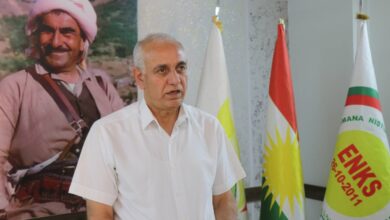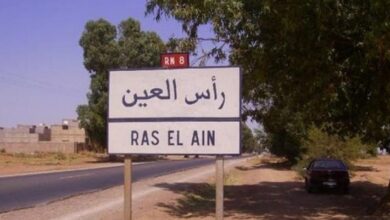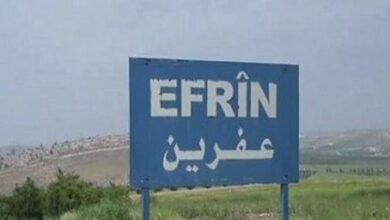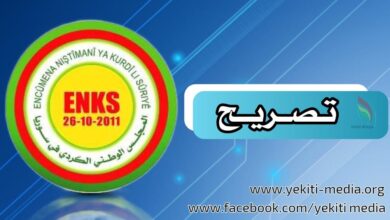Syrian Kurdish leader sees Turkish hand in border closure
The Kurdish government in Iraq has dealt a blow to Kurdish-controlled areas of northern Syria by keeping the border closed for more than one month, an economic and political setback for the Syrian region as it plans for wider autonomy.
The Kurdish administration in northeastern Syria believes it is being targeted by the Kurdish government in Iraq in coordination with regional power Turkey, which is deeply concerned by growing Kurdish sway in Syria.
The move has laid bare Kurdish divisions across the frontier that could complicate the Syrian Kurds’ political ambitions: Iraqi Kurds took the step the very week the Syrian Kurds and their allies announced plans for a new system of autonomous government in northern Syria.
The Iraqi Kurdish authorities gave no reason for the decision at the time the crossing was closed on March 16, Abdul Karim Saroukhan, the head of the Kurdish-led administration in northeastern Syria, told Reuters.
The crossing was closed as Syrian Kurdish and other groups met to approve plans to deepen their autonomy in northern Syria by establishing a new confederation of self-governing regions. The area is known in Kurdish as Rojava.
“It later became clear that this was to impose a complete siege on Rojava based – according to our information – on coordination between the (Iraqi) Kurdish region and the Turkish government,” Saroukhan said.
A senior Turkish official denied Turkey had a hand in the decision, while reiterating Turkey’s fierce opposition to any ethnically-based autonomous federation in Syria.
An Iraqi Kurdish official said the decision to close the border had nothing to do with federalism plans but was due to the “dictatorial behavior” of the main Syrian Kurdish party, the PYD, and its treatment of other Kurdish groups.
The official, Hamid Darbandi, also said the PYD had interfered in Iraqi affairs, without giving details.
“RESISTING” THROUGH SELF-SUFFICIENCY
Syrian Kurdish officials say the aim is not separatism, but a decentralized system of government which they say must be at the heart of any solution to the Syrian conflict. The plan faced criticism, however, including from the United States.
Saroukhan, who became head of the Syrian Kurdish-led government on April 5, however, said they were “trying as much as they can so this project does not succeed”. Their message was that “you are the small part of Kurdistan … and if you don’t do as we tell you, we won’t let you continue”, he said.
“This is their message to us. We’ve understood it. But we are determined to move in this approach – to resist, to be self-sufficient, to seek out other solutions,” he said, speaking to Reuters from the town of Amuda in northern Syria.
Kurds live as minorities in Iraq, Syria, Turkey and Iran. The Iraqi Kurds have sought to maximize their autonomy in recent years, building their own oil pipeline to Turkey. The Kurds make up the biggest ethnic minority in Syria, and faced systematic discrimination until the uprising in 2011.
Kurdish groups have taken control of wide areas of northern Syria since the country’s descent into war in 2011, including an uninterrupted 400 km (250 mile) stretch of the frontier with Turkey. The Kurdish YPG militia has been the most effective Syrian partner for the U.S.-led coalition against Islamic State.
With the Turkish border closed, the crossing to Iraqi Kurdistan from northeastern Syria has been used to bring in foodstuffs and building materials. Dozens of vehicles were crossing every day prior to the closure.
It was also an important route out of northeastern Syria.
FIGHTING ERUPTS IN QAMISHLI
A Syrian Kurdish delegation headed to Moscow was turned back three weeks ago, according to Idris Nassan, a former official in the Syrian Kurdish administration who was himself recently turned back.
While the flow of goods has dried up, Saroukhan said the region could cope thanks to its natural resources: the area is rich in agricultural land, and rudimentary refineries are being used to make gasoline and diesel from locally extracted oil.
Kurdish-controlled areas of Syria are bordered to the north by Turkey, to the east by Iraq, and to the south and southwest by Islamic State-held territory.
Flights from Damascus still operate to the city of Qamishli, where the airport is one of the few facilities still controlled by the Damascus government and is used for travel to government-held areas of the west where many Kurds live.
Several dozen people were killed last week in fighting in Qamishli between Syrian Kurdish and Syrian government security forces. It was the bloodiest incident of its kind in the city since the start of the Syria crisis. For the most part, Damascus and the Kurds have left each other to their own devices.
The outcome of the fighting was a further weakening of the Syrian government’s position in Qamishli, with Kurdish militia capturing several positions that will stay under their control according to the terms of a truce announced by the Kurdish side.
“The regime thought it could take Syria back to the way it was before 2011, but it does not realize that we have accomplished very much: military forces have been formed, and we have been able to run our society,” Saroukhan said.
“The regime has lost much of its strength, therefore this battle was to our benefit.”
(Additional reporting by Isabel Coles Erbil and Orhan Coskun in Ankara. editing by Peter Millership)
Reuters




